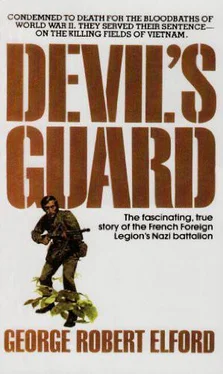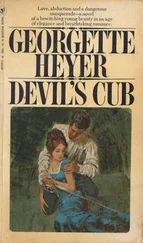Germans can suffer much hardship but never chaos. Sometimes we felt like grabbing a couple of machine guns to clean out the city, moving from bar to bar, from villa to villa, and from whorehouse to whorehouse, starting with the local police chief, then continuing with such exalted party leaders as Diem and his cabinet—the whole rotten system that turned the country into a quagmire which swallowed up money, material, and men. It was a relief when we were sent out to fight in the jungle. The foul stink of corruption and utter impotence that hung over Saigon was choking us. We celebrated the invasion of the North as the first real action the French had undertaken in Indochina. But unfortunately (and once again) the easy victory was not followed up by the political and social measures that were essential and could have consolidated the French conquest. Instead of cleaning house the French only added a few more garbage dumps to the already existing ones.
Viet Tri, a small village north of Hanoi, had become the headquarters of the Legion. The only benefit that we received from the invasion of the North was that Hanoi seemed less infested with the red ants that pestered our lives in the South. We were still intermixed with troops of every race and creed, the majority of whom were entirely at a loss in the kind of war we were obliged to fight.
The guerrilla movement expanded. Engagements became more frequent and we suffered heavy losses. Mixed troops can never fight well. Men with different experience, stamina, and temperament can only hinder each other. Once we were deployed around a small settlement west of Hanoi, where, according to intelligence reports, a guerrilla attack was expected within a few hours. Bernard Eisner had sent three African Legionnaires by jeep a few miles uproad. Their assignment was to keep a trail under observation. Suddenly we saw the jeep racing back, burning its tires in a cloud of dust. If its crew had fired they would have overtaken their own bullets.
“They are coming!” the men shouted as the vehicle skidded to a screaming halt “We have to move into the woods.”
“How many are they?” Eisner wanted to know.
“A thousand!” the North African corporal cried.
Bernard only lit a cigarette and asked for a cup of coffee, remarking, “If there are only a hundred, we will chew them up for breakfast.”
“I said a thousand!” The corporal corrected what he thought was a misunderstanding.
“I heard you,” Eisner reassured him. “But if you saw a thousand, there are only a hundred or even less.”
Eisner was right. We deployed along the road and wiped out the Viet Minh detachment of seventy men. Had we not been there, the North Africans would have evacuated the important road junction and a convoy coming along the road an hour later would have been shot up.
We spent most of our time trying to prop up the faltering platoons or rescuing those whose positions were overrun by the guerrillas. “The eternal German duty,” Eisner called it. Steadying a faltering ally, the Rumanians and Hungarians in Russia, the Italians in Africa, the French in Indochina. It was always the same story.
The Viet Minh soon realized on which section to concentrate an attack. They would seldom attack where we deployed. The effectiveness of the opposing fire alone had provided them the essential information as to where the hated Germans were. The enemy avoided us and concentrated on the Africans. But once they managed to break through a wavering flank we could do little about stemming the tide.
In the spring of 1948 we received a new commander. He was a short stocky man with a narrow Clark Gable moustache, dark hair and eyes; a tough, realistic officer who was willing to listen to the advice of experts, even if those experts happened to be ex-Nazi officers. To Colonel Simon Houssong, military service and political issues were two different things. Four days after he took charge of the brigade he called Eisner and me into his office.
“Sit down, gentlemen,” he addressed us in a stern but friendly manner. “My name is Colonel Simon Houssong. I am in charge here. I have examined some reports on a few of your achievements in Indochina and I think we will get along together. I am not particularly fond of Nazis but I’m a soldier who fought you in fair combat during the war and I can appreciate soldierly valor. As you probably know by now, you were accepted by the Legion and brought to Indochina to die. You refused to succumb where hundreds of others had perished. I know that you have been sent to accomplish nearly impossible tasks, yet you have survived and returned. From now on we will plan and work within reason and as a team. What you were and what you may have done before joining the Legion is of no importance to me. Now we are only Europeans trying to stem an eastern tidal wave which threatens to bury my country and your country alike. Should the Communists win here, they will spread death and destruction elsewhere, even in Europe. We are in the same boat now and we will have to forget about the past.”
We had a long informal talk about the general situation. The colonel seemed impressed by some of our suggestions. Soon our meeting looked more like a conference of general staff officers, rather than one of subordinates listening to their superior officer. The colonel ordered sandwiches and drinks. He addressed us as “Gentlemen” all the time. It was truly refreshing. After the first hour together we began to regard Houssong as shipwrecked sailors might regard a faraway lighthouse.
“I have not much sympathy for Nazis and particularly none for the SS,” he repeated. “But I have seen the SS in action—military action I mean,” he added with a smile. “Fight with the same zeal and we will get along fine.”
He went on. “What you have told me makes sense. The Viet Minh do follow Soviet and Chinese guerrilla strategy and tactics. From what you have told me I gather that you could counter them more effectively if given a chance. After all you have known them for a long time.”
From his desk he took a folder and handed me a thin, typewritten manuscript. “It is a translation of some of Mao Tse-tung’s concepts on guerrilla warfare. I am sure you will find most of it familiar from your experience in Russia, but adapted to local conditions. Study the material and bring it back when you are through with it. In the meantime I shall endeavor to concentrate you in a single fighting unit composed only of Germans. Should I succeed, I will see to it that you regain your former ranks.”
He shook hands with us, the first French officer to do so. We were not only overwhelmed but almost cried like children. “You do that, man colonel, and we will see that you are the most decorated officer in Indochina,” I said with enthusiasm before he dismissed us.
“I am not doing it either for decoration or for your benefit,” Colonel Houssong answered quietly but firmly, “I am doing it for France. France should not suffer another defeat—especially not from the hands of Stone-Age savages. Were it for the good of France, I would ally myself with the Devil himself. I don’t want to see Red flags flying either in Indochina or from the Eiffel Tower in Paris.”
The Viet Minh was not a newcomer in Indochina. They were not a postwar phenomenon as many people may think. The movement was born in the Chinese town of Tienshui, in 1941, with the aim of fighting the Japanese invaders in order to earn the right to self-determination after the war. The leader of the movement was a hardened professional Communist, Ho Chi Minh, who enjoyed the full support of the Allies. American weapons, advisers, and even commando troops had been placed at Ho’s disposal during the war, and the Viet Minh had fought the Japanese with resolution and bravery. After Japan’s defeat British forces occupied the southern half of the country but soon ceded power and administration to the former French - colonial overlords. Ho Chi Minh felt betrayed, and rightly so. His Viet Minh had not fought the Japanese so that the French could return. When he realized that the Allies were not even willing to talk with him about independence, he dissolved the Communist party and called every Indochinese patriot to gather under the flag of liberation. “Come to us, regardless of your political beliefs or social status,” Ho Chi Minh proclaimed. And the people came.
Читать дальше












